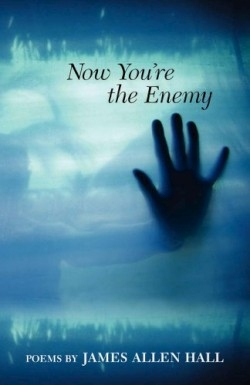Now You're the Enemy
- 2008 INDIES Finalist
- Finalist, Poetry (Adult Nonfiction)
The mother is the terrible god of these poems. She is the creator and destroyer, enthralling the speaker even as he knows she is his undoing. The poems are an effort to map a path toward reconciliation with a mythological childhood and the woman who ruled it, and find a way into an adulthood not crafted in her image.
James Allen Hall is assistant professor of English at Bethany College in West Virginia. He holds a PhD in Creative Writing from the University of Houston. This, his first collection of poems, was a finalist for the Walt Whitman Book Award.
The thirty-six poems are collected into two parts. Part one sketches out the origins of the early family history and dysfunction. “Touch” discusses the mother’s sexual abuse by her father. “Wedding Dress” chronicles her various marriages. “Safety” tries to erase one of her suicide attempts: “The mother inside the room / does not hold a gun to her chest.” In Part II, the speaker turns to sexuality and the lover to grapple with forming an autonomous identity and forgiving his past. In “Aubade,” a lover unknowingly brings up the past in a word game, silencing the speaker: “I lie in the dark, then I do what I always do, / I move, making space for heartbreak. // Then you move with me, until our bodies touch / in the ruins where I miss aching for a god.”
Fascinating as the mother is to the speaker, again and again he creates fantastic studies to try to understand her. He paints her portrait as the Republic of Texas and as the lead character in Rosemary’s Baby. The most beautiful is “Portrait of My Mother as Victorine Meurent,” in which the mother becomes Manet’s favorite model as she sits for paintings like Olympia and Mlle. Victorine en Costume d’Espada: “My mother does not blink. She is the mouth / where all blood leads. She is the thirsty god / and she wants to die[…]”
Bold as the poems are in exposing the family’s dirty laundry, there is an emotional distance which causes them to be more archeological evidence than soul-rending revelations. Perhaps it is difficult enough to reconcile a mother’s abuse and failures with the deep love and admiration she inspires to ask for more. Regardless, the poems are compelling with inventive phrasing and create enough of a flinch that the reader can not look away as the line between love and hate blurs.
Reviewed by
Naomi Millán
Disclosure: This article is not an endorsement, but a review. The publisher of this book provided free copies of the book to have their book reviewed by a professional reviewer. No fee was paid by the publisher for this review. Foreword Reviews only recommends books that we love. Foreword Magazine, Inc. is disclosing this in accordance with the Federal Trade Commission’s 16 CFR, Part 255.

